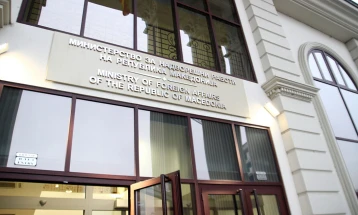2024-2028 Judicial Sector Development Strategy focused on five key priority areas
- The judiciary and the public prosecution, the capacities of special institutions of the justice system, individual professions and public services, the Constitutional Court and specific legal areas (criminal and civil matters) are the five key priority areas relevant to the functioning of the judiciary included in the 2024-2028 Judicial Sector Development Strategy that the Ministry of Justice presented on Thursday.

Skopje, 28 December 2023 (MIA) - The judiciary and the public prosecution, the capacities of special institutions of the justice system, individual professions and public services, the Constitutional Court and specific legal areas (criminal and civil matters) are the five key priority areas relevant to the functioning of the judiciary included in the 2024-2028 Judicial Sector Development Strategy that the Ministry of Justice presented on Thursday.
Justice Minister Krenar Lloga told Thursday's press briefing that the 2017-2022 Judicial Sector Development Strategy, the European Commission's progress reports on the country, as well as all previous reports within current IPA projects were taken as primary basis in the drafting of the new Strategy.
Academician Vlado Kambovski, who is part of the working group that prepared the Strategy, elaborated on the Strategy's priority areas, i.e. the Action Plan goals.
The first priority area - Judiciary and Public Prosecution, includes in line with EU standards amendments to the Law on the Judicial Council, amendments to the Law on the Council of Public Prosecutors - following the example of the Law on the Judicial Council, as well as amendments to the Law on the Courts and the Law on the Public Prosecution.
Clarification of the procedure for selecting a public prosecutor of the Basic Public Prosecutor's Office for prosecuting organized crime and corruption is also included, as well as strengthening the legal guarantees for independent and autonomous management of the court budget, set in accordance with the GDP defined in law (0.8 percent), including the implementation of centralized procurement.
In addition, an effective system is to be created for the payment of monetary compensation for lengthy litigations, established by the ECHR and the Supreme Court of the Republic of North Macedonia, as well as adoption of an ICT strategy for the justice system 2024-2028.
Activities within the priority area of strengthening the capacities, efficiency and effectiveness of the judicial institutions include strengthening the functionality of the judicial practice department at the Supreme Court for the unique application of laws and monitoring the jurisprudence of the European Court of Human Rights, establishing criteria for the complexity of cases in the Public Prosecutor's Office and review of the current competences of the State Attorney's Office in order to increase its competences in the protection of state property and interests and participation in court proceedings in which state property and state interests are affected.
The third priority area includes independent legal professions and public services, as well as the improvement of the institutional framework for practicing law, increasing efficiency, digitalization and responsibility, establishing prerequisites for increasing the efficiency of the work of notaries in guaranteeing legal certainty and increasing of the use of mediation in dispute resolution.
The Constitutional Court of the Republic of North Macedonia is included in the fourth priority area, which focuses on the implementation of a process of analysis and expert consultations for the introduction of the "constitutional appeal" through amendment of the Constitution based on a thorough assessment and consideration of its potential impact, and adoption of a special law on the Constitutional Court.
The fifth priority area includes reforms in special legal areas (criminal and civil), along with codification of the penal provisions in the Criminal Code and its alignment with European and international standards, adopting a new Law on Criminal Procedure in order to align with the relevant EU directives and overcome issues that have appeared in practice, a reformed justice for children system in accordance with international standards, regulation of international cooperation in criminal matters with EU members, in line with the EU acquis communautaire, codification of civil legislation into one comprehensive Civil Code and passing laws in special areas under the jurisdiction of the Justice Ministry (new Electoral Code, Law on Financing Political Parties, Law on Adequate and Fair Representation).
Photo: MIA







